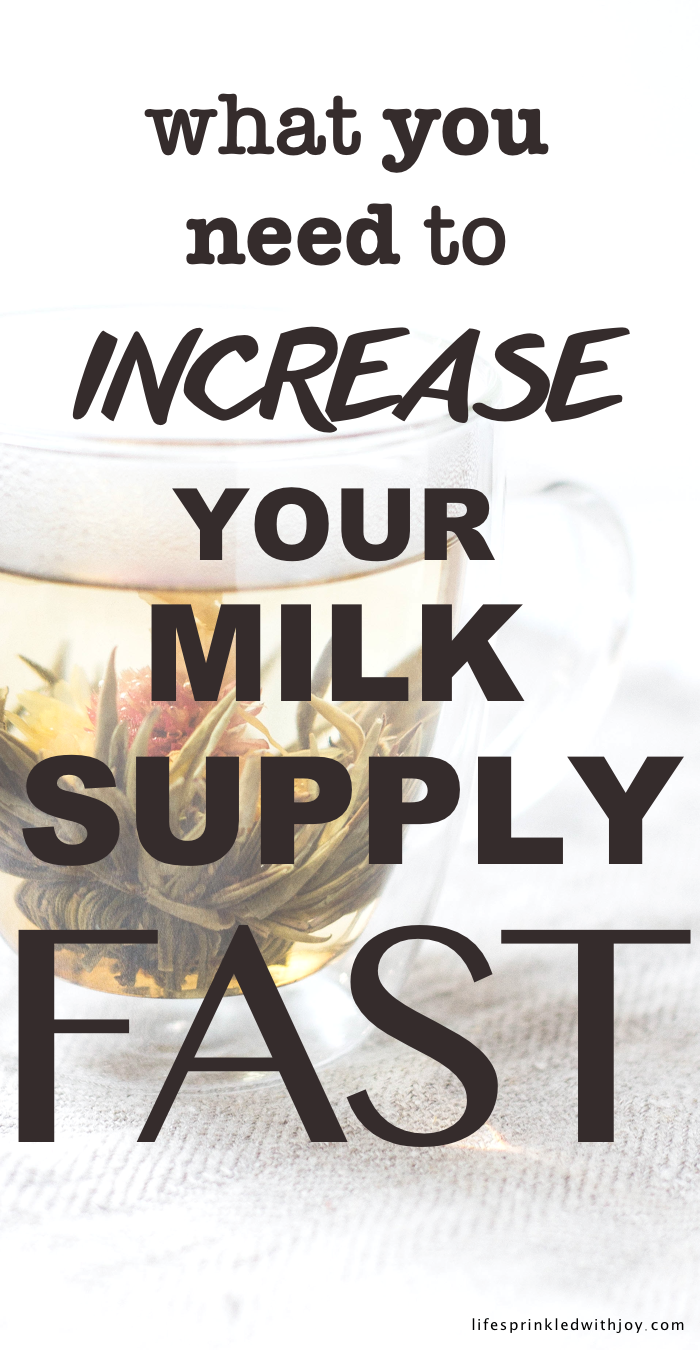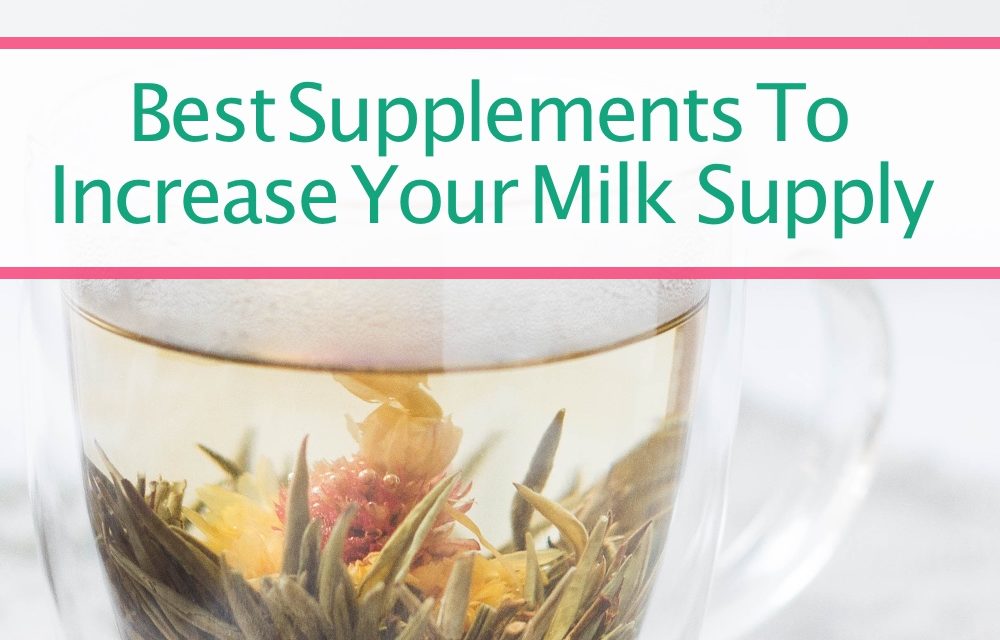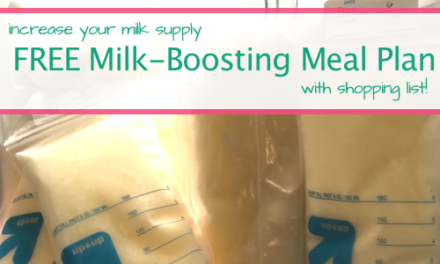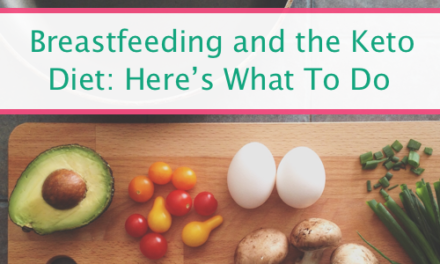Increasing your milk supply isn’t for the faint at heart, but I’m guessing if you’re reading this it means you’re up to the challenge. I had low milk supply in the beginning and tried every strategy and every supplement I could get my hands on to try to boost my breast milk production.
And by the time I was four weeks postpartum I was pumping 60 ounces a day.
But first thing’s first: Make sure low milk supply is really the issue.
This page probably contains affiliate links—you can read more about our affiliate policy here.
Check with an IBCLC certified lactation consultant on this one if you are nursing. Lactation consultants will help determine if baby has a good latch and is getting the most milk possible when breastfeeding. They’ll check for tongue tie and any issues with the baby’s frenulum. Also, work with your pediatrician to see if baby has low muscle tone—because this relates to sucking and swallowing too—and consider working with a physical therapist and/or speech therapist to improve baby’s strength and sucking ability.
Related: What To Do If You’re Baby Won’t Nurse
Also, check with your doctor too to make sure you don’t have a hormonal imbalance or any other issue that could affect breast milk production.
If you aren’t nursing but exclusively pumping, you should also meet with a certified lactation consultant. They can help determine if your pump is working properly, if the flanges are the right fit, and if baby really needs more than she’s getting.
Related: Worried About Low Milk Supply? Here’s What to Do
Remember that breastfeeding is all about supply-and-demand. Make sure you are nursing or pumping frequently. If nursing, your baby should come to the breast every 2-3 hours for the first two months, and you should be looking for nurtritive sucks and swallows. If exclusively pumping you need to be pumping at least 8 times a day (20 minutes each time) for 10-12 weeks before you can start dropping pumps (slowly!).
DO NOT SKIP THE MIDDLE-OF-THE-NIGHT PUMP!
Make sure you are pumping at least once between 1 am and 6 am, when your prolactin levels (the hormone that signals breastmilk production) are at their highest.
And remember–eating a well-rounded diet, eating enough calories, and staying hydrated is also ESSENTIAL for maintaining or increasing your breast milk supply. This isn’t the time to try to cut back on calories and lose weight fast.
That will come, trust me.
Related: Increase Your Breastmilk Supply With This Free Milk-Boosting Meal Plan!
Now, about those supplements…
Herbal Tea Supplements To Increase Your Milk Supply
Most teas you find at the store or online are blends, including herbs such as fenugreek, fennel, alfalfa, blessed thistle, hops, goat’s rue, marshmallow root, nettles, and anise. Of course you can make your own mother’s milk tea, but I DEFINITELY did not have time to do that AND care for a newborn, so I liked this one and this one.
Keep in mind you’ll need to drink at least three cups of tea a day to see results, although I have seen some claim their milk supply increased with just one cup a day.
Pills / Capsule Supplements As Milk Supply Boosters
For some moms this might be the way to go—because it’s easy and a lot of moms say they saw results pretty quickly. But you may have to take a good amount to see results.
Like, A LOT.
Fenugreek is the best known herb capsule for boosting milk supply, but you need to take AT LEAST 3500 mg per DAY for this to work. Once you start smelling like maple syrup you know it’s doing its magic. These are the fenugreek pills I took.
While there’s not a lot of research on why brewer’s yeast is considered a galactagogue (lactation-inducing food), I found my milk supply increasing while I took it. I didn’t take brewer’s yeast in capsule form (I took it via lactation cookies), but some moms swear they get better results using the capsules, like these.
Blessed thistle capsules are another supplement that’s often taken to increase milk supply. It appears to work best when taken alongside fenugreek and when there’s an increase in breast stimulation—so keep at the pumping! You’ll want to aim for up to 3 capsules three times a day to see any changes.
Keep in mind that these herbal supplements do not work for everyone. Many women see an adverse affect using fenugreek so again, talk to your lactation consultant BEFORE you begin taking any herbs or supplements.
Also, while these supplements are considered safe while breastfeeding, DO NOT CONTINUE USING if you become pregnant!
Tinctures To Keep The Milk Flowing
There are several herbal tinctures out there, and I only tried Motherlove More Milk Special Blend. It’s a blend of herbs in tincture form and is 100% organic. Some lactation consultants swear by it, but make sure you follow the instructions though to get the most benefits.
I’ll be straight with you—this tastes disgusting. But, if taken with food or Gatorade, it’s doable.
Vitamins To Keep You And Baby Healthy
After I had my daughter I just continued taking the same prenatals I took when I was pregnant. I wish I knew about these postnatal vitamins that also included powerful lactation-inducing herbs like fenugreek and fennel.
Ah, oh well…I’ll save these for the next baby
And…Gatorade
Yes, I know gatorade isn’t an herbal supplement—but I definitely think it played a HUGE role in helping to boost my milk supply. Go to Costco, get a big pack, and aim for 1-2 Gatorades a day.
Like I said before, I HIGHLY RECOMMEND you talk with your lactation consultant and doctor before taking ANY supplements.
There’s also Reglan, a prescription drug normally used to regulate nausea. There’s a catch with this one though—some studies show a correlation between taking it and developing or aggravating depression.
Some doctors won’t prescribe Reglan for that purpose. My doctor did, since I still didn’t have much milk at seven days postpartum, but he only prescribed me a two-week dosage.
Reglan works to get your prolactin levels up, so it may be worth a try if you are interested and have clearance from your doctor. I’ll say that I do have a history of depression, and with all I went through during and after delivering Squiggles I am SURPRISED I didn’t have any postpartum depression.
But postpartum depression is serious business so make sure you pay attention to it!
Many experts (doctors and lactation consultants) will tell you that supplements don’t make any difference. I can’t tell you who’s right and who isn’t, but I DID do the following and I was producing 60 ounces of breast milk EACH DAY by the end of my 5th week postpartum:
- Drinking TONS of water, Gatorade, and Coconut Water
- Taking in enough calories – especially from protein sources
- Eating lactation cookies and other galactagogues
- Drinking mother’s milk tea blends
- Pump after each feeding attempt for 20 minutes each time
- Not skipping the middle-of-the-night pump – pumping at least once between 1 am – 6 am
- Power Pumping
- Pump for 20 minutes, rest for 10 minutes, pump 10 minutes, rest 10 minutes.
- Renting a hospital grade pump for the first 8 weeks
So meet with your lactation consultant, try out some of these supplements, and share this article with other new mamas! If you have any other ideas on supplements to take to increase milk supply, comment below!







